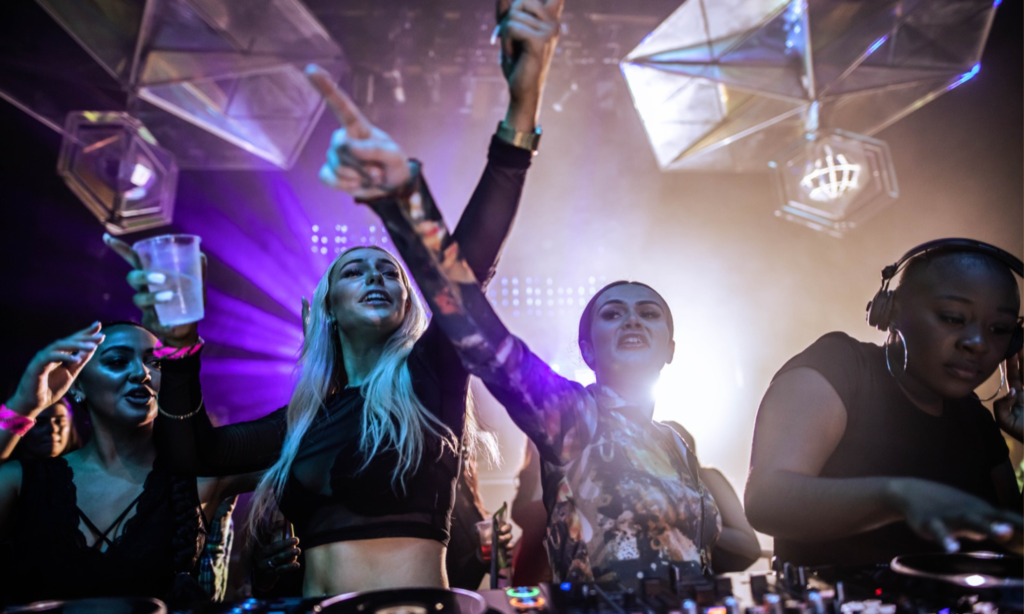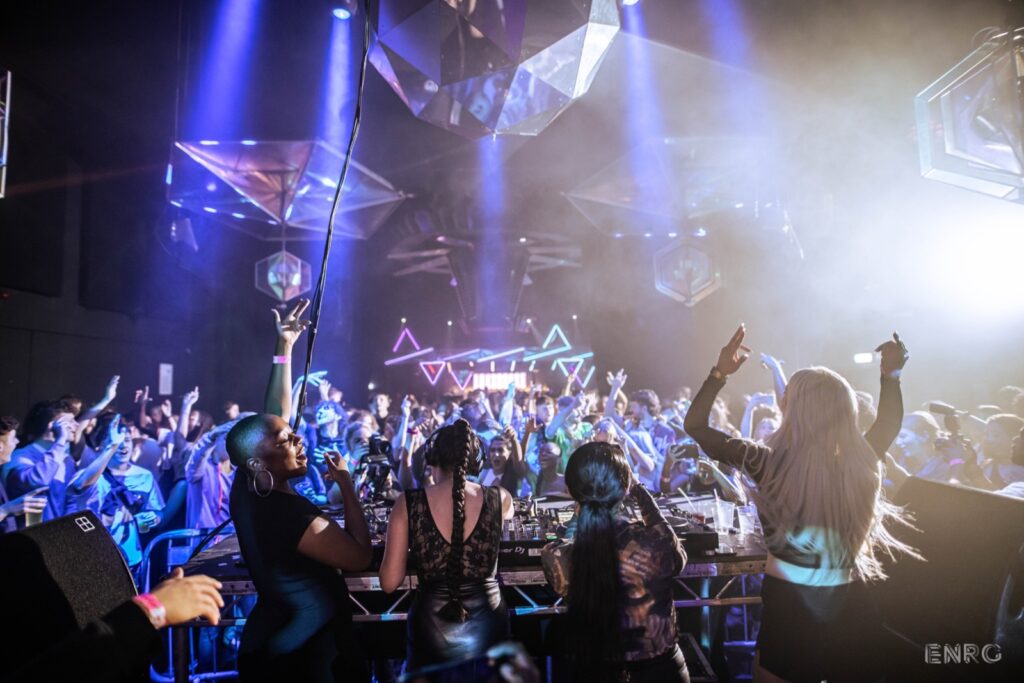
phocus.uk
‘It works so well because we’re best friends’: Girls Don’t Sync on breaking barriers while having fun
The DJ group on paving the way for women in music and why friendship is at the heart of their success.
Nali Simukulwa
29 Oct 2022
Joining a Zoom call with Girls Don’t Sync feels like arriving at a friend’s house for pre-drinks; the warm atmosphere lets you know you’re in good company and their excitable chatter bubbles into a feel-good frenzy. From the get-go, you can tell you’re in the presence of a group of best friends.
The Liverpool-based all-women DJ group comprises of Sophia Violet, 21, from Salisbury, Liverpool native Hannah Lynch, 26, and Londoners Matty Chiabi and Gaia Ahuja (who performs under the name G33), both 24. In the eighteen months since their genesis, the group have risen from intimate Liverpool club nights to playing some of the world’s most renowned stages including Glastonbury, Warehouse Project and Berlin’s Berghain. Now, they’re fully embarked on a mission to empower other aspiring women DJs and change the electronic music scene for the better.
“Sometimes I feel the need to work to a higher standard than male DJs because there’s a higher expectation.”
Their popularity proves the appetite for fresh female perspectives in dance music; a genre that remains dismally discriminatory: in 2022, only 28% of artists on electronic music festival lineups were women. It’s a reality the group are fully aware of; their name itself confronts the barriers that women DJs face. But despite their clear cut goals to pave new roads for women in music, the group’s catalyst to make music together arose from sheer enjoyment, “Our mission developed as we went on, we started out just having fun together,” Sophia tells gal-dem.
Aside from their commitment to fostering equality, their popularity comes from the simple fact that Girls Don’t Sync know how to throw a great party built from collaboration, communication, and a wealth of four diverse and rich music libraries at their disposal. They perform B2B (back-to-back), revving up audiences with tracks that shift from Hannah’s house classic selections to Matty’s latest Afrobeat tunes.
The genre blending achieved between the four allows the group to meld sets to suit diverse audiences across different occasions. It’s a fusion of sounds that each member credits to their heritage and upbringing: “My school days were during the height of UK garage and funky house but at home, my dad played a lot of south Asian and Arabic music and now I get to incorporate those influences in my work,” says Gaia who was raised in an Indian and Italian household. “Playing music [from across the world] opens up so many surprising new opportunities for connection.”
The sheer connection between the group and their audiences is what defines a Girls Don’t Sync party, “It’s very interactive when we perform, I’m usually standing on the table, Sophia’s screaming, Matty’s on the mic and Hannah has her gun fingers in the air. All of those moments between us make it what it is and the crowd feel it,” Gaia says.
“It’s very interactive when we perform. The crowd feel it”
With this winning formula, the group quickly expanded from intimate crowds in packed Liverpool clubs to larger sets on international stages, growing their friendship while honing their skills and sticking to their values. Even in the early stages, the group made sure to book other emerging female DJs as warm up acts; and the audience response to their all-women lineups was overwhelming. “We didn’t realise the power that had,” Sophia says.
Yet, as women and people of colour in the predominantly white and masculine industry of dance music, there are persistent challenges. “Within the Black community, a lot of us still associate dance music with white people, despite its Black origins so it’s frustrating having to justify why I am in dance music and why I love it,” says Matty, who is from a Zambian family. Sophia agrees with this sentiment, “When I tell people I’m a DJ, I’m met with mockery. Sometimes I feel the need to work to a higher standard than male DJs because there’s a higher expectation.”
Despite their obvious success and the clarity of their values and goals, the group continue to confront misogyny. “Because we’re young and we like to look sexy, we’re taken less seriously. We’ve headlined shows where the security are giving us hassle because they didn’t believe that we were the DJs,” says Gaia, echoing Matty and Sophia’s frustrations.
Aware of the tokenism within the music industry, the group refuse to be reduced to a diversity ‘tick box’. They recently pulled out of an event because they were the only women performing that night. “Some organisers see us as four girls – they book us so they can tick the ‘women’ box on their line up. It just can’t work like that,” Hannah continues.
Such experiences have led the group to take matters into their own hands to break bad industry practices. Hannah, Gaia and Sophia now hold DJ lessons targeted towards young people in Liverpool, hoping to widen participation and make dance music a safer space for women and people of colour. “I do it because so many young girls were telling me they found DJ-ing cool but they had nowhere to go learn skills, let alone somewhere they would also be taught by a woman, which I think is so important.” Hannah says.
Operating with passion and inclusivity, the group have won hearts across the globe, yet they are reluctant to use the word ‘fans’ to refer to their crowds. “When we DJ, it’s a big party. We’re at one with the crowd, enjoying the music all together,” says Hannah. The group’s closeness to their audiences comes down to the fact that they themselves are part of the demographic they aim to engage. Hannah recounts meeting some of their supporters in an airport, who were thrilled after the group gave them tickets to one of their sets. “They were so grateful, but for us it’s minor because we want them there, we want to be around other women and other people of colour.”
“Championing and helping other women and being able to do that with real impact… is success to us”
Judging by their success so far, it seems anything is possible looking ahead. “Someone once asked what our dreams for Girls Don’t Sync were, and I was joking around saying “international, baby”. Now, we’re on a flight every five minutes,” Hannah laughs. Looking to the future, the group are open to whatever it may bring, knowing they will continue using their platform to destroy barriers. “I’d love to have a Girls Don’t Sync scholarship scheme,” Gaia says. “That was our original ethos, championing and helping other women and being able to do that with real impact, that is success to us.”
The contribution of our members is crucial. Their support enables us to be proudly independent, challenge the whitewashed media landscape and most importantly, platform the work of marginalised communities. To continue this mission, we need to grow gal-dem to 6,000 members – and we can only do this with your support.
As a member you will enjoy exclusive access to our gal-dem Discord channel and Culture Club, live chats with our editors, skill shares, discounts, events, newsletters and more! Support our community and become a member today from as little as £4.99 a month.











